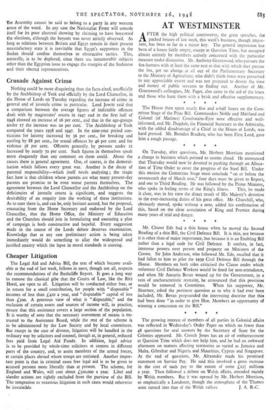Cheaper Litigation
The Legal Aid and Advice Bill, the text of which became avail- able at the end of last week, follows in most, though not all, respects the recommendations of the Rushcliffe Report. It goes a long way to remove the classical gibe that the Courts of Law, like the Ritz Hotel, are open to all. Litigation will be conducted either free, or in return for a small contribution, for people with " disposable " incomes of less than £420 a year, and " disputable " capital of less than L5oo. A generous view of what is "disputable," and the exclusion of certain assets and sources of income will, in practice, ensure that this assistance covers a large section of the population. It is worthy of note that the necessary assessment of means is en- trusted to the Assistance' Board, while the rest of the scheme is to be administered by the Law Society and by local committees. But except in the case of divorce, litigation will be handled in the ordinary way by solicitors and counsel, though at, in general, reduced fees paid from Legal Aid Funds. In addition, legal advice is to be provided by whole-time solicitors at centres in different parts of the country, and, to assist members of the armed forces, at certain places abroad where troops are stationed. Another impor- tant point is that in criminal cases free legal aid is to be given to accused persons more liberally than at present. The scheme, for England and Wales, will cost about £5oo,00p a year. Libel and slander actions are rightly excluded from the purview of the Bill. The temptation to vexatious litigation in such cases would otherwise be irresistible




































 Previous page
Previous page